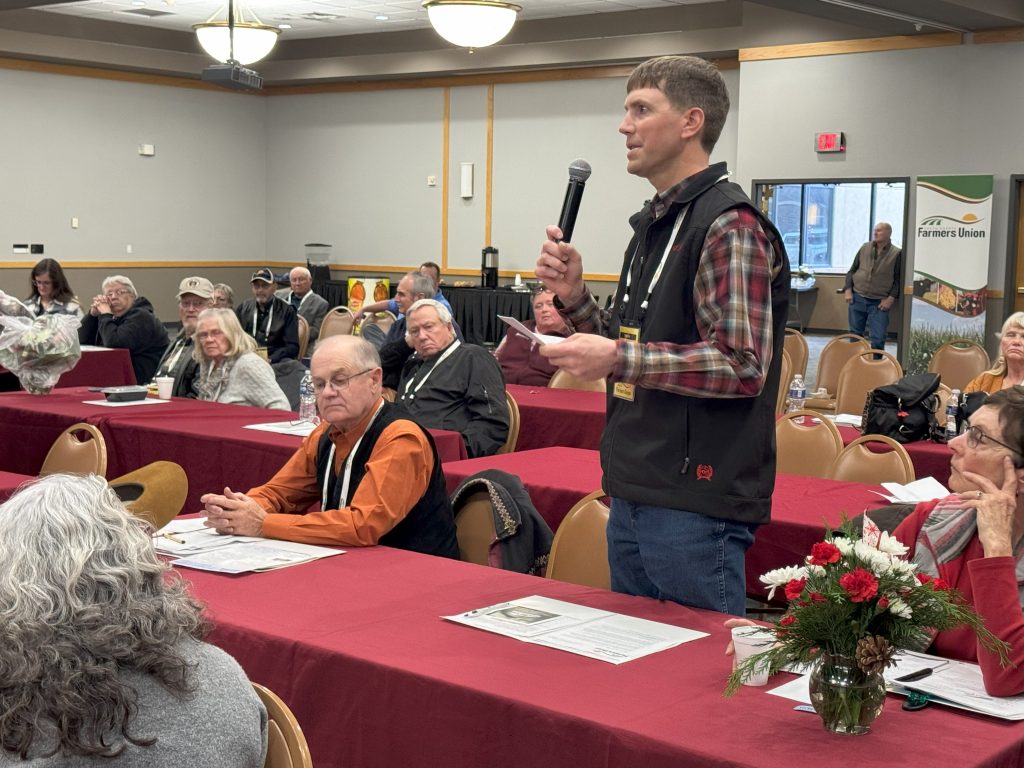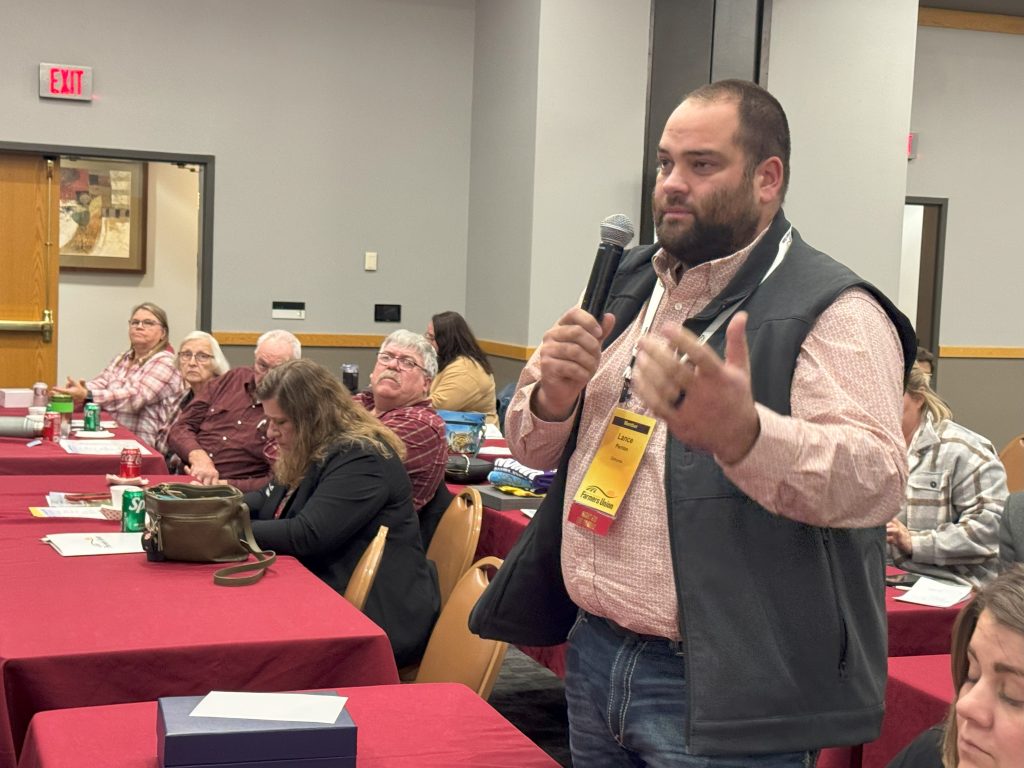Legislator and Farmers Do Not Agree on Tax Reform Idea
By Lura Roti

Tax reform was the focus of a panel discussion held during the 109th South Dakota Farmers Union State Convention.
And although panelists, farmers and ranchers did not all agree on the type of change, most all could agree, “property taxes stink.”
This is a direct quote from Matt Krogman, South Dakota Realtors Association Lobbyist.
Krogman was among the four panelists invited to discuss potential tax reform. Along with Krogman, the other panelists were Tony Venhuizen, Vice Chair of the Joint Appropriation Committee; Karl Adam, President of the South Dakota Bankers Association and David Owens, President of the South Dakota Chamber of Commerce & Industry.
To complete his thoughts on property taxes, Krogman added, “It’s confusing. It’s complicated. It isn’t a fun topic.”
But property taxes – specifically owner-occupied property taxes – are a topic that needs to be addressed according to Venhuizen. “Over the last 10 years or so, the trend is that owner-occupied tax has grown much faster than the others. …Up almost 60 percent. Commercial is 47 percent and ag land 28 percent. …it really seems like voters are reaching a point where something’s gotta give one way or another.”
Venhuizen’s solution is found in a bill he will introduce during the 2025 Legislative Session. The bill would raise the sales tax from 4.2 percent to 5 percent. The increase in sales tax would raise $248 million and this money would go toward education. And the sales tax increase would reduce owner-occupied property tax by 35 percent.
Venhuizen represents portions of Lincoln and Minnehaha Counties. The bill is co-sponsored by Randy Deibert who represents the Black Hills community of Spearfish.
“You can look at some assessment mechanisms which might solve some problems around the margins, but none of them take care of the fact that property tax has gone up for homeowners 60 percent in the last 10 years,” Venhuizen said.
Venhuizen’s bill introduces one of three options that could happen to lower taxes, explained Owens. “If we’re going to see significant tax reform and property taxes, one of three things has to happen:
- You have to have extra money to put into the system – which he has provided with the sales tax increase.
- You have to shift taxes from one division to another which is marked with caution because commercial land might be the target for that. …
- The other answer is to cut $250-to-$300 million out of the budget.
I’m telling you, since it’s already missing $100 million because of the sales tax rollback, I don’t think you can find that kind of shift.”
Owens said when it comes to tax reform, as it pertains to property taxes, he would feel more comfortable with an individualized approach so that homeowners would not be taxed out of their homes.
Taxing homeowners out of their homes is a concern Colome farmer, Joel Keierleber voiced during the panel discussion Q&A. “We need tax reform that does not draw so much from farmers through taxes on property. Tax reform needs to increase property tax on wealthy investors, but not homeowners. I heard that in areas, like Jackson Hole, Wyoming, rich people have pushed the property tax up so much that average-income families are not able to afford to live there.”
Input from citizens is important as the 2025 Legislative Session approaches, Adam said. “As bankers we partner with everyone – owner-occupied, commercial and ag land. Bankers want to be at the table,” he said. “Property tax reform is important. It’s important for all of you in this room (family farmers and ranchers.) It is important for your neighbors and friends and the entire state of South Dakota. There does need to be a discussion and Venhuizen’s bill does get the conversation started.”

South Dakota Farmers Union agrees there does need to be a conversation focused on tax reform, explained President Doug Sombke. “We voted this summer to organize a coalition so that all stakeholders can have a voice.”
As for initial solutions, Frankfort farmer, Kurt Bindenagel said Venhuizen’s bill is not the answer.
“It’s a very unfavorable,” Bindenagel said. “It’s a bad idea for farmers because farmers would be negatively impacted by the 5 percent sales tax. Think about the cost of our inputs. When you look at the price of equipment, whether it be a tractor, corn planter or combine, the prices have continued to increase.”

Ipswich farmer Lance Perrion also saw issues with Venhuizen’s bill. “It is a tough time economically and people are struggling to put food on the table and keep the lights on and make the payments. And now you are going to increase the tax on groceries?”
Although Perrion does not agree with Venhuizen’s solution to tax reform, he, like most South Dakotans, agrees that there is a need for tax reform. “We have roads and bridges that need to be maintained and schools that need to operate. And right now the ag economy is kind of slowing up with commodity prices down and interest rates up. No one is volunteering to pay more taxes, so it is a tough conversation no matter what you do. But you do need to address the inevitable.”
The tax reform panel is the first of many conversations the state’s largest agriculture organization plans to have as it pertains to tax reform. “Our organization does not shy away from tough conversations,” Sombke said. “And we look forward to collaborating with other organizations throughout the state to find solutions to tax reform that do not have a negative impact on South Dakotans.”
To learn more about how South Dakota Farmers Union works to support family farmers, ranchers and rural communities, visit www.sdfu.org.

